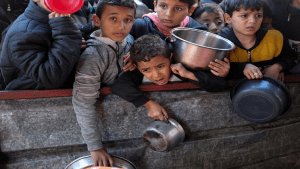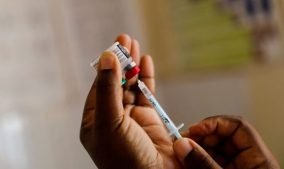The COVID-19 crisis has a potentially far-reaching, long-term negative impact on children around the world, Human Rights Watch said in a report released on Friday. The organisation says the impact is likely to be devastating, even though children who contract COVID-19 appear to have less severe symptoms and lower mortality rates than other age groups.
“The risks posed by the COVID-19 crisis to children are enormous,” says children’s rights advocacy director at Human Rights Watch Jo Becker.
“Governments need to act urgently to protect children during the pandemic, but also to consider how their decisions now will best uphold children’s rights after the crisis ends.”
Becker says for many children, the COVID-19 crisis will mean limited or no education, or falling further behind their peers. More than 91% of the world’s students are out of school, due to school closures in at least 188 countries.
The crisis has exposed vast disparities in countries’ emergency preparedness, internet access for children, and availability of learning materials. Although much focus has turned to online learning platforms, many public schools are not set up to use them or do not have the technology and equipment to provide online teaching.
Nearly half of the world has no internet access.
In the video below, psychological effects of COVID-19 on children:
Heightened risk of violence
The Human Rights Watch says added family stresses related to the COVID-19 crisis – including job loss, isolation, excessive confinement, and anxieties over health and finances – heighten the risk of violence in the home, including both between partners and by caregivers against children.
“The United Nations secretary-general has reported a “horrifying” global surge in domestic-based violence linked to COVID-19, and calls to helplines in some countries have reportedly doubled. Child abuse is less likely to be detected during the COVID-19 crisis, as child protection agencies have reduced monitoring to avoid spreading the virus, and teachers are less able to detect signs of ill treatment with schools closed.”
Experts estimate that the global total of COVID-19 deaths could eventually reach 10 to 40-million, which will inevitably leave many children without one or both parents or other caregivers.
Orphaned children are particularly vulnerable to trafficking and other exploitation, including sexual exploitation, forced begging, selling goods on the streets, and other child labor. Older children often drop out of school to try to support younger siblings.
In the video below, children talks about coronavirus:
Child labour and marriage
The rights organisation says global economic downturn caused by the COVID-19 crisis, including massive global job losses, is likely to increase rates of child labour and child marriage.
“Globally, an estimated 152-million children were already engaged in child labour before the COVID-19 pandemic, with 73 million engaged in hazardous work. Research has shown that child labour is highly associated with financial shocks experienced by a family, such as illness, disability, or a parent’s loss of employment.”
The report warns that COVID-19 crisis has also heightens the risk of online child sexual exploitation. Europol has reported that law enforcement partners are reporting “increased online activity by those seeking child abuse material,” as a result of COVID-19.
“Children are spending more time online due to school shutdowns, and may be anxious or lonely because of isolation and confinement, making them more vulnerable to online predators.”
It also raises concerns about the millions of children detained in the justice system, immigration detention, or confined in orphanages. The organisation says as the COVID-19 pandemic overwhelms health systems, children may no longer receive immunizations or have access to life-saving basic health care. “Reduced access to treatment during the 2014-2015 Ebola outbreak in West Africa led to dramatic increases in deaths from malaria, HIV/AIDS, and tuberculosis, including among children.”
It is urging governments to take urgent measures to protect children’s rights, including by:
- Prioritising efforts to continue education for all children, using all available technology;
- Providing economic assistance, including cash transfers, to low-income families that will be hit first and hardest, to help them meet basic needs without resorting to child labor or child marriage;
- Minimizing disruptions in children’s access to essential and life-saving healthcare services;
- Increasing efforts to identify children orphaned by COVID-19 and expanding networks of extended family and foster care;
- Expanding public education, awareness campaigns, hotlines, and other services for children at risk of violence in the home or online sexual exploitation;
- Transferring children deprived of liberty to family-based care and ensuring suitable accommodation and sanitation for refugee, migrant, and internally displaced children.






